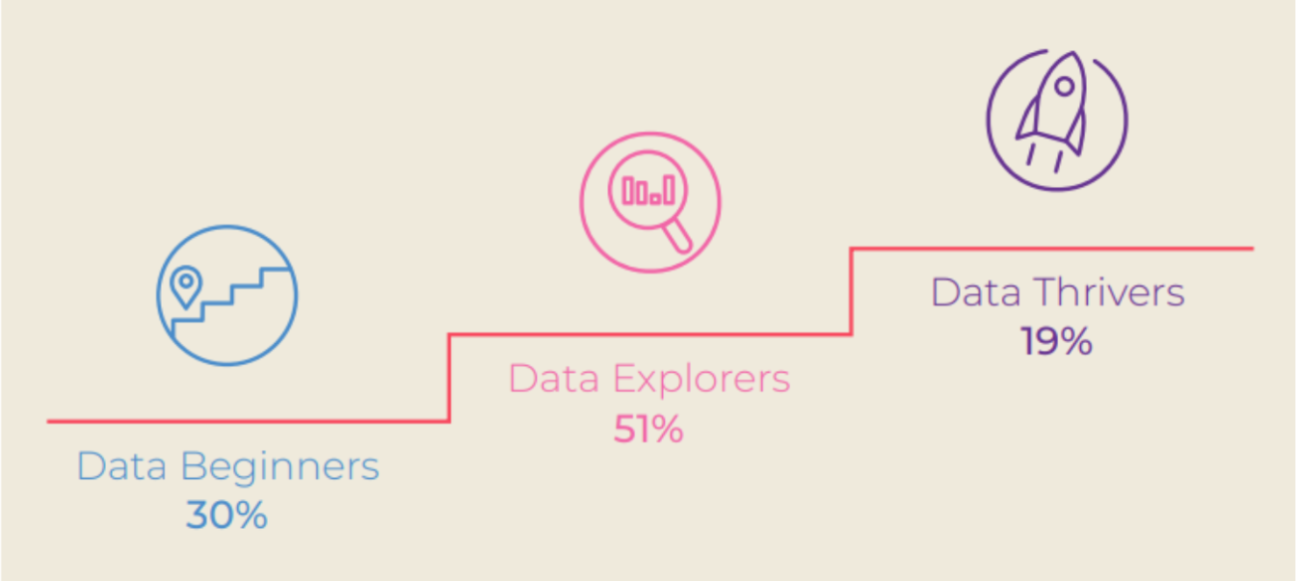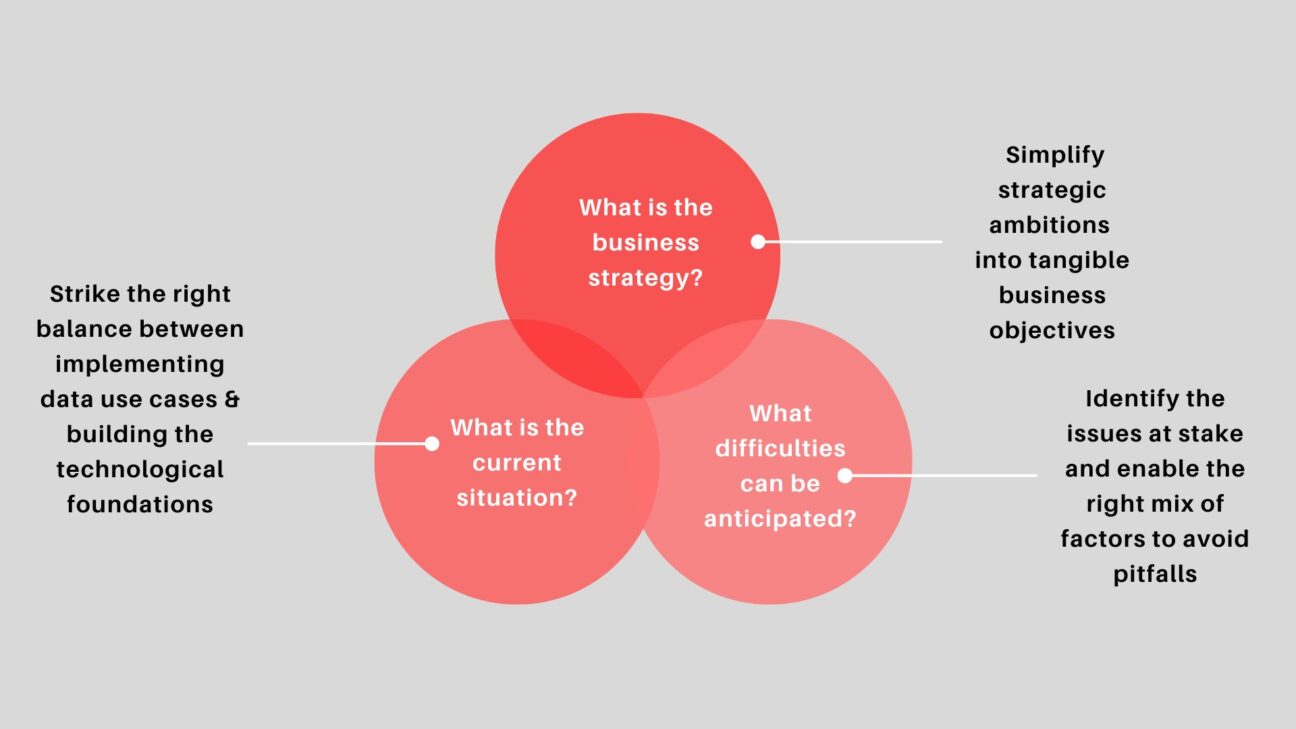
The exponential growth of data has forced organisations to redefine their strategy to become data first and generate high-impact business value. Gone are the days when data giants such as Google, Microsoft or Netflix, pioneers in their field, were the only players to put data at the centre of their value proposition: Deciding with data is now a key value driver for businesses, and this is only the beginning.
What if data was not just an IT issue?
It is vital to understand that data now drives the customer and user experience and the overall business strategy. It is the information at the heart of all operations and processes, and is fed by multi-channel functions in the organisation. Consequently, it should be placed at the centre of the business model and can no longer be treated as a sum of isolated projects to be managed.
From a massive amount of time delegated to the IT department to generate a reliable data map, most organisations are now aware that data quality is the key to creating effective value over time and at scale. This is even more true if we take into account the new sources of external data – social networks, open data, big data, etc. – and the evolution of their use in the fields of machine learning (ML), artificial intelligence (AI), Robotic Process Automation (RPA), etc.
Data should be considered as information – pure and simple. The creation of business value is based on the meaning given to this information, something the IT department is not able to answer alone. Data is a business subject that belongs to the business, and technology is the facilitator of its provision.
The three levels of maturity in organisations
Thanks to an IDC survey on EMEA organisations, three types of maturity (seen in figure 1) have been identified in regards with data management. These maturity levels reveal the degree of transition organisations have made to become data-driven:
- Data Beginners (50% of organisations), which are trying to find the right path to embark in their data journey;
- Data Explorers (30%), which need to standardise and scale up their data management;
- Data Thrivers (20%), which have successfully managed to infuse data within their culture, all processes and business decisions.

While the dedicated IDC white paper further analyses these three categories of data maturity, it explains the challenge data represent for organisations and helps them understand how they can efficiently move from one level to the other.
Take a few minutes and take the test to know the level of data maturity in your organisation.
A calm approach to the data journey
Knowing your level of maturity is a good starting point for initiating your data transformation effectively. Hereafter a multitude of factors come into play to define a roadmap: What is the company’s strategy? What is the organisation (Data, IT, business)? How much autonomy is left to the departments? What is the geographical footprint? What is the corporate culture? Have use cases already been identified or implemented (and with what governance)? What technological stacks are in place? And so on.
There is no universal game plan to follow. Nevertheless, organisations should consider three things beforehand:

1) What is the business strategy?
This question clearly is paramount. Investing heavily in solutions is expensive and does not necessarily serve the business strategy. Instead be pragmatic and translate strategic ambition into tangible business objectives: More customers? Increased turnover? Modernised customer experience? Improved performance? And so on.
2) What is the current situation?
Once the business strategy has been clearly identified it’s important to define the starting point and determine the right balance between implementing data use cases and building the technological foundations.
Here the HR area is typically key: The acquisition of experienced talent, the specialised training of existing internal resources (data owner, data steward, data curator, etc.) and the constitution of a data office (data management, data science, data engineering, data architecture, data analyst, etc.) can significantly strengthen the operational execution of the project.
3) What difficulties can be anticipated?
The data transformation journey will not be without difficulties that will need to be handled on the way. Some can be identified before or early in the process and hereby mitigation can be planned. Some typical pitfalls are:
- Imbalance in data strategy, either by being too focused on use cases or predominantly on technology
- Giving full responsibility of data management to the IT department
- Overlooking the company history because digital transformation is a long process that impacts the entire staff and culture
- Not staying focused on the business objectives set
While the list cannot be exhaustive, as each organisation is unique and specific, the time invested upstream of the transformation project will strongly impact its success. Taking the time to define strategy, align business and IT, measure the technological foundations and assign optimal data governance according to the operational model is crucial for the data transformation to be effective over time and at scale. This operational dynamic must be complemented by an efficient acculturation of data within the organisation so that data is at the heart of all projects and all business actors.
In addition to these internal reflections, support from a specialised partner can facilitate the identification of the issues at stake and enable the right mix of factors to be activated between culture, strategy, business impact, operation model, technology to be implemented, target governance, etc.
What does the data of tomorrow look like?
The growing use of data in organisations and the increasingly frequent use of data science and AI (although not widespread) predict a future that is as flourishing as it is multi-faceted. But this future will require a profound transformation.
As we have seen, companies are producing more and more data. But generating quality data is becoming a priority, and organisations must carry out a profound and total overhaul of their processes. The entire business value chain must be data-driven (or data-centric, i.e. data consumer and data producer) to guarantee the success of the transformation. Technology will support this paradigm shift and is evolving every day to serve this objective, developing more and more tools for companies: Artificial intelligence (AI), Robotic Process Automation,´ (RPA), machine learning (ML), etc.
How will data affect business areas like HR?
We will also see an HR revolution, which has already begun. The data buzz and the acceleration of certain companies with their data-driven business strategy have created new jobs and new skills, which organisations are struggling to acquire, as the talent shortage is so acute. It can even be assumed that some data jobs do not yet exist. To meet this growing need for knowledge sharing, some organisations are choosing to share their data with strategic partners in secure spaces to learn how to optimise it. In this respect, we are convinced that the future of data will also involve academies co-constructed by data transformation experts and ambitious clients.
But the future of data will not be without ethics. This fundamental notion allows organisations to set limits in the exploration and exploitation of data and is both a philosophical (“What am I allowed to do when no one is watching me?”) and technological issue. This ethical principle also extends to the ESG dynamics to which organisations are subject to. There is, therefore, the ethics of data, but also data for ethics, in order to measure and steer its impact on the environment and, more generally, on tomorrow’s society in a data-driven way.
In conclusion
Managing data to create business value implies that data should no longer be considered a purely IT subject and should instead be at the centre of business issues and the strategy of organisations. It is a very powerful lever for growth, operational efficiency and differentiation.
Moving forward step by step and capitalising on internal resources or via a partner will make it possible to establish the right balance over time between the :
- Definition of the strategic vision, which translates the business strategy and feeds into acculturation, and which is based on a realistic analysis of the situation to date
- Identification of the most valuable business use cases
- Implementation of an adapted, relevant and sustainable technological base for the scaling up of data
If you want to know the level of maturity of your organisation or simply to understand data issues even better, don’t hesitate to consult our dedicated white paper From Data to Impact: Ready or Not.